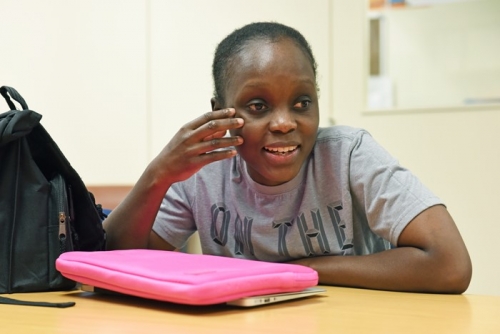A lesson in persistence


Computer science PhD student Joan Byamugisha is focusing on natural language generation in her mother tongue of Runyankore.
At first she thought she was coming down with a bout of malaria, but a lab technician picked up that she had an extremely high white blood cell count. The diagnosis was leukemia and within weeks the disease had irreparably damaged her optic nerves, which robbed her not only of her sight but also her dream of becoming a doctor.
What followed was a period of rapid adjustment. Joan was still determined to pursue a university education, but although Makerere allowed her to enroll for some science courses, she was at sea.
“Obviously I couldn’t do it. I had never used a computer with screen-reading software. I didn’t know braille. There was no way of reading back what I needed to.”
So Joan spent four months learning braille and the necessary computer skills. When her brother, who had a background in IT, suggested she consider studying computer science, her academic career was born.
“You just come”
From the outset, Joan loved programming – “it’s completely text-based and I didn’t have to worry about images.”
With Makerere University unable to assist, she enrolled at the Uganda Martyrs University (UMU) in 2005, which welcomed her as their first visually impaired student.
“UMU were very, very good,” she says. “I remember the registrar saying, ‘You just come and we’ll see what we can do.’ ”
Three years later she emerged with a first-class bachelor’s degree in computer science and economics, but she soon found that nobody wanted to employ a blind person. Undeterred, she studied further, enrolling for a distance-learning master’s in software engineering at De Montfort University in Leicester.
After completing her master’s in 2011, Joan landed a job at UMU lecturing in the IT department and heading their new special needs department. The academic bug had bitten, however, and by 2013 Joan realised that she needed to start working towards a PhD before she got “too comfortable”.
Programming for indigenous languages
At first, she considered focusing on speech recognition software in her local language of Runyankore, but soon realised that she would need to take a step back.
“If you want to teach a computer how to talk, it has to learn how to process the words. But if the language itself does not have computational resources, that has to be the starting point.”
Instead, she is now focusing on natural language generation (NLG) and is working on a grammar engine that will be able to recognise the grammar rules in Runyankore to output sentences for computer-generated prescriptions in the health-care sector.
While her research is specific to Runyankore and a particular application, the underlying principles can be generalised to languages such as isiZulu and isiXhosa. What they have in common is that the grammar is based on the noun-class system, which determines the rules for verb conjugation and noun categorisation.
Initially, she applied for and was accepted to do her PhD at the Queensland University of Technology in Australia but funding was not forthcoming.
“In a way, that helped”, says the ever-positive Joan, “because there is so much I did not know regarding natural language processing and computational linguistics.”
Instead, she took a year out to brush up her skills in both these areas, and to write papers which would help her applications for PhD studies elsewhere.
Settling in at UCT
Then the UCT opportunity came up in 2014 via the Hasso Plattner Institute. She found herself having to complete a flurry of forms and to pack up over a weekend to make it in time for registration.
To help Joan settle in, her mother travelled with her. She now lives at Obz Square, which she says is an easier environment to get around – “you can count doors”. Also, Pick n Pay is close by and UCT’s Disability Service provides transport to upper campus.
She is full of praise for the Disability Service, which has helped to settle her in and to jump a few additional hurdles.
One such hurdle was the fact that she arrived with only a paperback copy of the Runyankore dictionary that she needed for her studies. Denise Oldham arranged for student volunteers to transcribe the entire dictionary – a process that took around three months.
And then there was her recent trip to Pretoria to the Turkish embassy for a visa interview so that she could go to the conference she’d been invited to. It was her first solo trip since losing her sight and the Disability Service made all the transport arrangements.
She is hoping to travel to Turkey with Dr Langa Khumalo, who is one of the co-authors of the paper she is to present. But if that’s not possible, she says she’ll have to “bite the bullet again” and tackle the trip on her own.
With her funding set to carry through to 2018, she hopes to graduate in June of that year.
Is she proud of what she’s achieved thus far? She laughs: “Not yet, but I will be when I wear the cap and get the doctor title.”
And what happens after that?
“I want to work where I’ll be most productive. I don’t care where.”
Story Andrea Weiss. Photo Michael Hammond.
